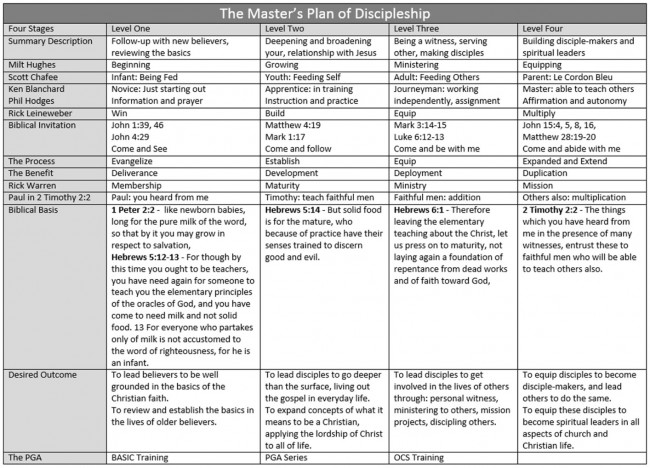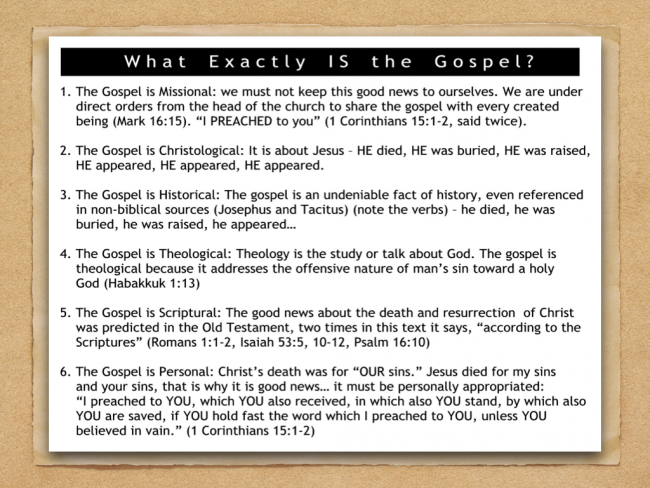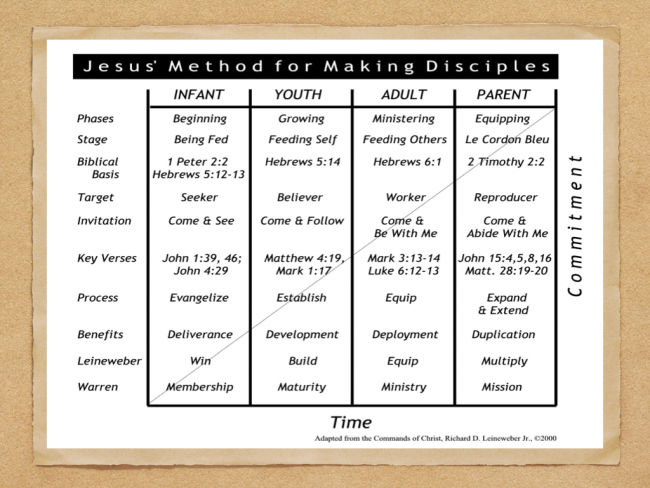Today we get to the second command in the Win – Infant – Membership level; Repent and Believe the Gospel (Mark 1:14-15). Here is the overview of the six commands at this level:
- Come and See – Invitation – John 1:35-51
- Repent and Believe – Salvation – Mark 1:14-15, Luke 4:14-15
- Fear, a Barrier to Faith – Luke 12:4-12
- Greed, a Barrier to Faith – Luke 12:13-21
- Baptism – Matthew 28:19-20
- Evangelism – John 4:3-42
Why did Jesus withdraw to Galilee? (Mark 1:14)
- Political pressure of the Pharisees (John 4:1).
- John the Baptist into prison by Herod (Matthew 4:12, Mark 1:14, Luke 3:19-20).
- The influence of the Holy Spirit (Luke 4:14).
On the way, Jesus ministers to non-religious people (John 4:5-42, John 4:46-54).
This section and command is about the essence of the Good News, if we receive the gospel in faith and repent of our sin. It also involves humility since I am admitting that I need forgiveness, am a sinner, and I cannot trust in in myself for my salvation. Notice that Jesus’ teaching is identical to the message of John the Baptist (Matthew 3:2, 8, 11, Mark 1:4, 1:15, Luke 3:3, 8, Acts 13:24, 19:4).
Repentance is a central theme in the gospel:
- Jesus preached the necessity of repentance, (Matthew 4:17, 9:13, 11:20-21, 12:41, Mark 1:15, 2:17, Luke 5:31-32, 11:32, 13:3-5, 15:7, 10, 16:30, 24:47).
- Disciples preached the message of repentance (Mark 6:12).
- Repentance is illustrated in the book of Acts:
- Peter, Acts 2:38, 3:19, 8:22, 11:18.
- Paul, Acts 17:30, 20:21, 26:20.
- Repentance is amplified in the epistles:
- By Paul writes about repentance in Romans 2:4, 2 Corinthians 7:9-10, 2 Timothy 2:25.
- By the writer of Hebrews 6:1, 6, 12:17.
- By Peter, 2 Peter 3:9.
- By John, Revelation 9:20-21, 16:9, 11.
What was the message of Jesus? (Matthew 4:17, Mark 1:14-15, Galatians 1:6-9, 1 Corinthians 15:1-4).
- Repent and believe IN the gospel
- The kingdom of heaven (or kingdom of God) is at hand.
- Hope and mercy, not accusation and condemnation (John 3:16-17).
What is the gospel?
- Romans chapters 1-6 is a clear presentation and reality of the gospel.
- Galatians 1:6-9, 3:8, is a clarification of the gospel, which people had distorted.
- A concise synopsis of the gospel is found in 1 Corinthians 15:1-5, an early creed, according to the Scriptures…
- The death of Jesus
- The resurrection of Jesus
What is the kingdom of God?
The coming of the kingdom of God is the initial, central, and final declaration of Christ.
- It began with repent and believe, Mark 1:14-15.
- It is expanded in the Sermon on the Mount, Matthew 5-7.
- It would set a dawning course of this age, Matthew 24:14.
Seven aspects unfolded in God’s revelation:
- God as Creator is proprietor and ruler of all (Psalm 10:16, 24:1-2, 9-10).
- God is Israel’s king, even if they wanted an earthly king (Judges 8:22-23, 1 Samuel 8:4-9).
- While allowing a line of human kings, God establishes a theocracy through his prophets (1 Samuel 13:14, 2 Samuel 7:15-16, Isaiah 11:1-9, Daniel 7:13-14)
- Jesus comes from the Davidic line (Matthew 1:1, Luke 1:23-33) and offers the kingdom promised through the prophets, which the people of God rejected (Luke 19:11).
- Jewish rejection of the Good News opened the door of salvation to the Gentiles, the new aspect took the form of the mystery of the church, in which, Christ reigns (John 3:3-5, Colossians 1:13).
- The kingdom is temporarily hidden in the hearts of men, but Jesus will one day appear, ushering in a new kingdom (Revelation 20:4-6).
- God’s reign is forever, but the earthly kingdom will one day end and give way to the Messiah’s eternal kingdom (1 Corinthians 15:24-26, 28, 2 Timothy 4:18, Revelation 22:3, 5).
What does “is at hand” mean?
- Supernatural powers: these powers came upon those who heard the proclamation and witnessed the signs (Matthew 12:28, Luke 11:20).
- Personal presence of the king: he was actually in their midst (Luke 17:21). Luke 17:21 KJV says “within” but in no sense would the kingdom be within the Pharisees, in context, they had just charged Jesus with blasphemy! (Matthew 12:24-28).
- An actual kingdom: an actual establishment of a government on earth, the tense is “has drawn near.” Jesus established and built his church (Matthew 16:18), which he governs the citizens of his kingdom. A long-awaited kingdom of OT prophecy was now seen in the face of Jesus, and others witnessed the kingdom in the miracles Jesus performed.
What is saving faith?
- An intellectual assent, or belief? (James 2:19). If this were true, even the demons would be saved.
- Is it trusting God in the here and now for temporal relief? (John 2:23-25)
- Transferring trust OFF of ourselves and ONTO Jesus alone for eternal relief from the wrath to come (Matthew 3:7-10, Romans 5:8-9)
- GRACE = God’s Riches At Christ’s Expense, Jesus paid the debt I could not pay.
- Grace alone will save us (Titus 2:11, 1 Corinthians 15:1-4)
- Our works contribute nothing to our salvation (Romans 3:23-24, 4:2-5, Ephesians 2:8-9, Titus 3:5, 2 Timothy 2:9)
What does repentance mean?
- Metanioa means change of mind.
- About sin (Revelation 9:20-21)
- About God (Acts 2:38, 20:21)
- About Dead works (Hebrews 6:1)
- More than a change of mind, but a change of behavior.
- Repentance is changing FROM something TO something; about-face, a 180 degree turn.
Is repentance necessary for salvation?
- Repentance that leads to life (Acts 11:18)
- For all to come to repentance (2 Peter 3:9). To change one’s mind regarding Jesus Christ (Acts 2:38).
- Repentance does not save (since salvation is by grace through faith, Ephesians 2:8-9) but how can you be saved without repentance of mind and behavior?
What is the result of true repentance?
- Bearing fruit (Matthew 3:8, Luke 3:8-14), the question, “what shall we do?” are examples.
- Turn to God, and perform deeds appropriate to repentance (Acts 26:19-20).
- Jesus commissioned his followers to preach repentance for the forgiveness of sins (Luke 24:47).
What four things lead to repentance?
- God’s Word (Luke 16:29-31)
- God’s goodness or kindness (Romans 2:4)
- Godly sorrow (2 Corinthians 7:9-11)
- God’s intervention (2 Timothy 2:25)
What is godly sorrow vs. worldly sorrow?
- The example in the Corinthians church (2 Corinthians 7:9-11). A person had been involved with open and grievous sin, church discipline had worked, and the offender had repented.
- Judas had worldly sorrow (Matthew 27:3-5, Acts 1:18-20), remorse that led to suicide.
- Peter had godly sorrow (Matthew 26:75).
What are the characteristics of godly sorrow? (2 Corinthians 7:11)
- “What earnestness” – diligence to try to change things in contrast to previous indifference.
- “What vindication of yourselves” – eagerness to clear oneself.
- “What indignation” – anger that they have troubled others with their sin.
- “What fear” – fear over God’s displeasure.
- “What longing” – yearning to see the matter rectified and relationships restored.
- “What zeal” – enthusiasm to do what is right.
- “What avenging of wrong” – a readiness to turn against oneself.
[Based on my classes with Richard D. Leineweber, Jr. c. 2000]



